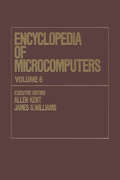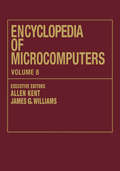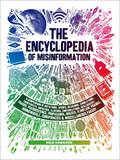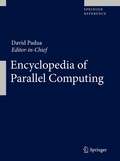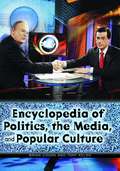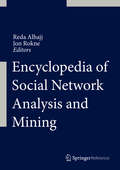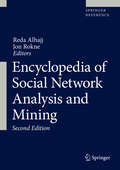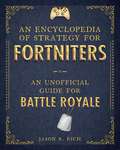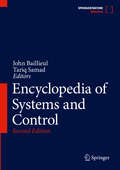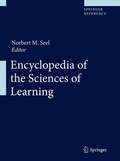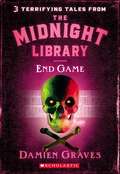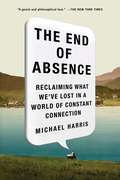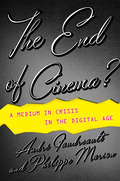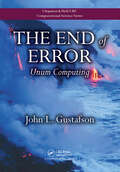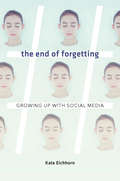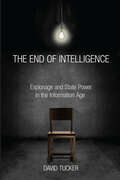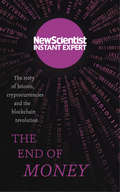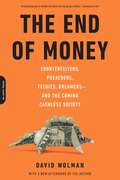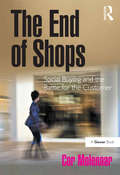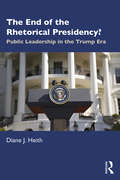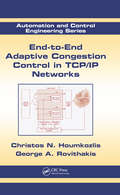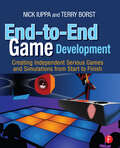- Table View
- List View
Encyclopedia of Microcomputers: Volume 6 - Electronic Dictionaries in Machine Translation to Evaluation of Software: Microsoft Word Version 4.0 (Microcomputers Encyclopedia Ser.)
by Allen Kent James G. Williams"The Encyclopedia of Microcomputers serves as the ideal companion reference to the popular Encyclopedia of Computer Science and Technology. Now in its 10th year of publication, this timely reference work details the broad spectrum of microcomputer technology, including microcomputer history; explains and illustrates the use of microcomputers throughout academe, business, government, and society in general; and assesses the future impact of this rapidly changing technology."
Encyclopedia of Microcomputers: Volume 8 - Geographic Information System to Hypertext (Microcomputers Encyclopedia Ser.)
by Allen Kent James G. Williams Carolyn M. Hall Rosalind Kent"The Encyclopedia of Microcomputers serves as the ideal companion reference to the popular Encyclopedia of Computer Science and Technology. Now in its 10th year of publication, this timely reference work details the broad spectrum of microcomputer technology, including microcomputer history; explains and illustrates the use of microcomputers throughout academe, business, government, and society in general; and assesses the future impact of this rapidly changing technology."
The Encyclopedia of Misinformation: A Compendium of Imitations, Spoofs, Delusions, Simulations, Counterfeits, Impostors, Illusions, Confabulations, Skullduggery, ... Conspiracies & Miscellaneous Fakery
by Rex Sorgatz“In an era of ‘alternative facts,’ Rex Sorgatz’s The Encyclopedia of Misinformation helps put things in perspective.” —Fast CompanyThis compendium of misinformation, deception, and self-delusion throughout history examines fakery in the context of science and advertising, humor and law, sports and video games, and beyond. Entries span eclectic topics: Artificial Intelligence, Auto-Tune, Chilean Sea Bass, Clickbait, Cognitive Dissonance, Cryptids, False Flag Operations, Gaslighting, Gerrymandering, Kayfabe, Laugh Tracks, Milli Vanilli, P.T. Barnum, Photoshopping, Potemkin Villages, Ponzi Schemes, Rachel Dolezal, Strategery, Truthiness, and the Uncanny Valley. From A to Z, this is the definitive guide to how we are tricked, and how we trick ourselves.“Occasional salty language and pop-culture references make this compendium of 300 short entries a delightful mix of high- and lowbrow.” —Booklist
Encyclopedia of Parallel Computing
by David PaduaContaining over 300 entries in an A-Z format, the Encyclopedia of Parallel Computing provides easy, intuitive access to relevant information for professionals and researchers seeking access to any aspect within the broad field of parallel computing. Topics for this comprehensive reference were selected, written, and peer-reviewed by an international pool of distinguished researchers in the field. The Encyclopedia is broad in scope, covering machine organization, programming languages, algorithms, and applications. Within each area, concepts, designs, and specific implementations are presented. The highly-structured essays in this work comprise synonyms, a definition and discussion of the topic, bibliographies, and links to related literature. Extensive cross-references to other entries within the Encyclopedia support efficient, user-friendly searchers for immediate access to useful information. Key concepts presented in the Encyclopedia of Parallel Computing include; laws and metrics; specific numerical and non-numerical algorithms; asynchronous algorithms; libraries of subroutines; benchmark suites; applications; sequential consistency and cache coherency; machine classes such as clusters, shared-memory multiprocessors, special-purpose machines and dataflow machines; specific machines such as Cray supercomputers, IBM's cell processor and Intel's multicore machines; race detection and auto parallelization; parallel programming languages, synchronization primitives, collective operations, message passing libraries, checkpointing, and operating systems. Topics covered: Speedup, Efficiency, Isoefficiency, Redundancy, Amdahls law, Computer Architecture Concepts, Parallel Machine Designs, Benmarks, Parallel Programming concepts & design, Algorithms, Parallel applications. This authoritative reference will be published in two formats: print and online. The online edition features hyperlinks to cross-references and to additional significant research. Related Subjects: supercomputing, high-performance computing, distributed computing
Encyclopedia Of Politics, The Media, And Popular Culture
by Tony Kelso Brian A. CoganMedia in this country has helped shaped culture, which has affected politics, which in turn has influenced how those same media behave. The inter-relatedness of these societal elements is distinctive. Part I of this book is thematically organized by chapter examining these relationships from both a historical and contemporary perspective. Part II presented alphabetically arranged entries for people, programs, and events related to these subjects. The book succeeds at being a handy reference work, or just a fun volume to peruse. Annotation c2010 Book News, Inc., Portland, OR (booknews.com)
Encyclopedia of Social Network Analysis and Mining
by Reda Alhajj Jon RokneEncyclopedia of Social Network Analysis and Mining
Encyclopedia of Social Network Analysis and Mining
by Reda Alhajj Jon RokneSocial Network Analysis and Mining Encyclopedia (ESNAM) is the first major reference work to integrate fundamental concepts and research directions in the areas of social networks and applications to data mining. The second edition of ESNAM is a truly outstanding reference appealing to researchers, practitioners, instructors and students (both undergraduate and graduate), as well as the general public. This updated reference integrates all basics concepts and research efforts under one umbrella. Coverage has been expanded to include new emerging topics such as crowdsourcing, opinion mining, and sentiment analysis. Revised content of existing material keeps the encyclopedia current. The second edition is intended for college students as well as public and academic libraries. It is anticipated to continue to stimulate more awareness of social network applications and research efforts.The advent of electronic communication, and in particular on-line communities, have created social networks of hitherto unimaginable sizes. Reflecting the interdisciplinary nature of this unique field, the essential contributions of diverse disciplines, from computer science, mathematics, and statistics to sociology and behavioral science, are described among the 300 authoritative yet highly readable entries. Students will find a world of information and insight behind the familiar façade of the social networks in which they participate. Researchers and practitioners will benefit from a comprehensive perspective on the methodologies for analysis of constructed networks, and the data mining and machine learning techniques that have proved attractive for sophisticated knowledge discovery in complex applications. Also addressed is the application of social network methodologies to other domains, such as web networks and biological networks.
Encyclopedia of Software Engineering Three-Volume Set (Print)
by Phillip A. LaplanteSoftware engineering requires specialized knowledge of a broad spectrum of topics, including the construction of software and the platforms, applications, and environments in which the software operates as well as an understanding of the people who build and use the software. Offering an authoritative perspective, the two volumes of the Encyclopedia of Software Engineering cover the entire multidisciplinary scope of this important field. More than 200 expert contributors and reviewers from industry and academia across 21 countries provide easy-to-read entries that cover software requirements, design, construction, testing, maintenance, configuration management, quality control, and software engineering management tools and methods. Editor Phillip A. Laplante uses the most universally recognized definition of the areas of relevance to software engineering, the Software Engineering Body of Knowledge (SWEBOK®), as a template for organizing the material. Also available in an electronic format, this encyclopedia supplies software engineering students, IT professionals, researchers, managers, and scholars with unrivaled coverage of the topics that encompass this ever-changing field. Also Available OnlineThis Taylor & Francis encyclopedia is also available through online subscription, offering a variety of extra benefits for researchers, students, and librarians, including: Citation tracking and alerts Active reference linking Saved searches and marked lists HTML and PDF format options Contact Taylor and Francis for more information or to inquire about subscription options and print/online combination packages.US: (Tel) 1.888.318.2367; (E-mail) e-reference@taylorandfrancis.comInternational: (Tel) +44 (0) 20 7017 6062; (E-mail) online.sales@tandf.co.uk
An Encyclopedia of Strategy for Fortniters: An Unofficial Guide for Battle Royale (Encyclopedia for Fortniters #1)
by Jason R. RichThe Ultimate Unofficial Encyclopedia for Fortniters is a full-color, easy-to-read, unofficial reference tool that explains—from “A” to “Z”—everything players need to know in order to consistently win matches and successfully control their characters. <P><P>The Ultimate Unofficial Encyclopedia for Fortniters provides a comprehensive overview of the game—making it easier for first-time players to quickly get acclimated with the game—while, at the same time, it introduces more experienced players to countless advanced tips and strategies that will allow them to quickly improve their skills and survival rates. The tips and strategies included are related to safe exploration, creative building, offensive and defensive fighting techniques, and cunning survival skills. <P><P>Each of the more than one hundred topics covered within The Ultimate Unofficial Encyclopedia for Fortniters includes a detailed description, full-color screenshots, and appropriate tips and strategies that apply to the current and future versions of the game. This book is a must-read guide and information-packed resource for every Fortnite: Battle Royale player.
Encyclopedia of Systems and Control
by John Baillieul Tariq SamadThe Encyclopedia of Systems and Control collects a broad range of short expository articles that describe the current state of the art in the central topics of control and systems engineering as well as in many of the related fields in which control is an enabling technology. The editors have assembled the most comprehensive reference possible, and this has been greatly facilitated by the publisher’s commitment to continuously publish updates to the articles as they become available in the future. Although control engineering is now a mature discipline, it remains an area in which there is a great deal of research activity, and as new developments in both theory and applications become available, they will be included in the online version of the encyclopedia. A carefully chosen team of leading authorities in the field has written the well over 300 articles, 50 of them new in the second edition. The topics range from basic principles of feedback in servomechanisms to advanced topics such as the control of Boolean networks and evolutionary game theory and this range has also been expanded to include material on such subjects as the Internet of Things, quantum control and smart grids. Because the content has been selected to reflect both foundational importance and subjects that are of current interest to the research and practitioner communities, a broad readership that includes students, application engineers, and research scientists will find entries that are of interest.
Encyclopedia of Terminology for Educational Communications and Technology
by Rita C RicheyThe Encyclopedia of Terminology for Educational Communications and Technology is a volume of scholarly definitions and short discussions of approximately 180 key terms of the field. Each 200-500 word entry includes material such as the salient attributes of the term, any alternative views and interpretations of the term, and future trends. The definition discussions are supported with relevant literature from educational communications and technology and related fields, such as communications or educational psychology. Individual signed entries are written by over 50 established scholars from throughout the field and throughout the world. The terms included in the encyclopedia cover the many topics addressed by the field's practitioners and scholars. They encompass six general categories of educational technology content - foundational subjects, instructional design, technology and media, analysis and evaluation, management and organizational improvement, and research and theory.
Encyclopedia of the Sciences of Learning
by Norbert M. SeelOver the past century, educational psychologists and researchers have posited many theories to explain how individuals learn, i.e. how they acquire, organize and deploy knowledge and skills. The 20th century can be considered the century of psychology on learning and related fields of interest (such as motivation, cognition, metacognition etc.) and it is fascinating to see the various mainstreams of learning, remembered and forgotten over the 20th century and note that basic assumptions of early theories survived several paradigm shifts of psychology and epistemology. Beyond folk psychology and its naïve theories of learning, psychological learning theories can be grouped into some basic categories, such as behaviorist learning theories, connectionist learning theories, cognitive learning theories, constructivist learning theories, and social learning theories. Learning theories are not limited to psychology and related fields of interest but rather we can find the topic of learning in various disciplines, such as philosophy and epistemology, education, information science, biology, and - as a result of the emergence of computer technologies - especially also in the field of computer sciences and artificial intelligence. As a consequence, machine learning struck a chord in the 1980s and became an important field of the learning sciences in general. As the learning sciences became more specialized and complex, the various fields of interest were widely spread and separated from each other; as a consequence, even presently, there is no comprehensive overview of the sciences of learning or the central theoretical concepts and vocabulary on which researchers rely. The Encyclopedia of the Sciences of Learning provides an up-to-date, broad and authoritative coverage of the specific terms mostly used in the sciences of learning and its related fields, including relevant areas of instruction, pedagogy, cognitive sciences, and especially machine learning and knowledge engineering. This modern compendium will be an indispensable source of information for scientists, educators, engineers, and technical staff active in all fields of learning. More specifically, the Encyclopedia provides fast access to the most relevant theoretical terms provides up-to-date, broad and authoritative coverage of the most important theories within the various fields of the learning sciences and adjacent sciences and communication technologies; supplies clear and precise explanations of the theoretical terms, cross-references to related entries and up-to-date references to important research and publications. The Encyclopedia also contains biographical entries of individuals who have substantially contributed to the sciences of learning; the entries are written by a distinguished panel of researchers in the various fields of the learning sciences.
End Game (The Midnight Library #3)
by Damien GravesSimon prefers computer games to reality, but a shockingly real turn of events might mean "Game Over" -- forever. This story and two additional contributions equal three more ways to define the word "fear".
The End of Absence
by Michael HarrisSoon enough, nobody will remember life before the Internet. What does this unavoidable fact mean? Those of us who have lived both with and without the crowded connectivity of online life have a rare opportunity. We can still recognize the difference between Before and After. We catch ourselves idly reaching for our phones at the bus stop. Or we notice how, midconversation, a fumbling friend dives into the perfect recall of Google. In this eloquent and thought-provoking book, Michael Harris argues that amid all the changes we're experiencing, the most interesting is the end of absence-the loss of lack. The daydreaming silences in our lives are filled; the burning solitudes are extinguished. There's no true "free time" when you carry a smartphone. Today's rarest commodity is the chance to be alone with your thoughts. Michael Harris is an award-winning journalist and a contributing editor at Western Living and Vancouvermagazines. He lives in Toronto, Canada.ct recall of Google. In this eloquent and thought-provoking book, Michael Harris argues that amid all the changes we're experiencing, the most interesting is the one that future generations will find hardest to grasp. That is the end of absence--the loss of lack. The daydreaming silences in our lives are filled; the burning solitudes are extinguished. There's no true "free time" when you carry a smartphone. Today's rarest commodity is the chance to be alone with your own thoughts. To understand our predicament, and what we should do about it, Harris explores this "loss of lack" in chapters devoted to every corner of our lives, from sex and commerce to memory and attention span. His book is a kind of witness for the "straddle generation"--a burst of empathy for those of us who suspect that our technologies use us as much as we use them. By placing our situation in a rich historical context, Harris helps us remember which parts of that earlier world we don't want to lose forever. He urges us to look up--even briefly--from our screens. To remain awake to what came before. To again take pleasure in absence.
The End of Absence
by Michael Harris"Every revolution in communication technology--from papyrus to the printing press to Twitter--is as much an opportunity to be drawn away from something as it is to be drawn toward something. And yet, as we embrace a techonology's gifts, we usually fail to consider what we're giving up in the process. Why would we bother to register the end of solitude, of ignorance, of lack? Why would we care that an absence had disappeared?" Soon enough, nobody will remember life before the Internet. What does this unavoidable fact mean? For future generations, it won't mean anything very obvious. They will be so immersed in online life that questions about the Internet's basic purpose or meaning will vanish. But those of us who have lived both with and without the crowded connectivity of online life have a rare opportunity. We can still recognize the difference between Before and After. We catch ourselves idly reaching for our phones at the bus stop. Or we notice how, mid-conversation, a fumbling friend dives into the perfect recall of Google. In this eloquent and thought-provoking book, Michael Harris argues that amid all the changes we're experiencing, the most interesting is the one that future generations will find hardest to grasp. That is the end of absence--the loss of lack. The daydreaming silences in our lives are filled; the burning solitudes are extinguished. There's no true "free time" when you carry a smartphone. Today's rarest commodity is the chance to be alone with your own thoughts. To understand our predicament, and what we should do about it, Harris explores this "loss of lack" in chapters devoted to every corner of our lives, from sex and commerce to memory and attention span. His book is a kind of witness for the "straddle generation"--a burst of empathy for those of us who suspect that our technologies use us as much as we use them. By placing our situation in a rich historical context, Harris helps us remember which parts of that earlier world we don't want to lose forever. He urges us to look up--even briefly--from our screens. To remain awake to what came before. To again take pleasure in absence.
The End of Cinema?
by Philippe Marion Timothy Barnard André GaudreaultIs a film watched on a video screen still cinema? Have digital compositing, motion capture, and other advanced technologies remade or obliterated the craft? Rooted in their hypothesis of the "double birth of media," André Gaudreault and Philippe Marion take a positive look at cinema's ongoing digital revolution and reaffirm its central place in a rapidly expanding media landscape.The authors begin with an overview of the extreme positions held by opposing camps in the debate over cinema: the "digitalphobes" who lament the implosion of cinema and the "digitalphiles" who celebrate its new, vital incarnation. Throughout, they remind readers that cinema has never been a static medium but a series of processes and transformations powering a dynamic art. From their perspective, the digital revolution is the eighth major crisis in the history of motion pictures, with more disruptions to come. Brokering a peace among all sides, Gaudreault and Marion emphasize the cultural practice of cinema over rigid claims on its identity, moving toward a common conception of cinema to better understand where it is headed next.
The End of Error: Unum Computing (Chapman & Hall/CRC Computational Science #24)
by John L. GustafsonThe Future of Numerical Computing Written by one of the foremost experts in high-performance computing and the inventor of Gustafson’s Law, The End of Error: Unum Computing explains a new approach to computer arithmetic: the universal number (unum). The unum encompasses all IEEE floating-point formats as well as fixed-point and exact integer arithmetic. This new number type obtains more accurate answers than floating-point arithmetic yet uses fewer bits in many cases, saving memory, bandwidth, energy, and power. A Complete Revamp of Computer Arithmetic from the Ground Up Richly illustrated in color, this groundbreaking book represents a fundamental change in how to perform calculations automatically. It illustrates how this novel approach can solve problems that have vexed engineers and scientists for decades, including problems that have been historically limited to serial processing. Suitable for Anyone Using Computers for Calculations The book is accessible to anyone who uses computers for technical calculations, with much of the book only requiring high school math. The author makes the mathematics interesting through numerous analogies. He clearly defines jargon and uses color-coded boxes for mathematical formulas, computer code, important descriptions, and exercises.
The End of Forgetting: Growing Up with Social Media
by Kate EichhornThanks to Facebook and Instagram, our younger selves have been captured and preserved online. But what happens, Kate Eichhorn asks, when we can’t leave our most embarrassing moments behind? Rather than a childhood cut short by a loss of innocence, the real crisis of the digital age may be the specter of a childhood that can never be forgotten.
The End of Intelligence: Espionage and State Power in the Information Age
by David TuckerUsing espionage as a test case, The End of Intelligence criticizes claims that the recent information revolution has weakened the state, revolutionized warfare, and changed the balance of power between states and non-state actors—and it assesses the potential for realizing any hopes we might have for reforming intelligence and espionage. Examining espionage, counterintelligence, and covert action, the book argues that, contrary to prevailing views, the information revolution is increasing the power of states relative to non-state actors and threatening privacy more than secrecy. Arguing that intelligence organizations may be taken as the paradigmatic organizations of the information age, author David Tucker shows the limits of information gathering and analysis even in these organizations, where failures at self-knowledge point to broader limits on human knowledge—even in our supposed age of transparency. He argues that, in this complex context, both intuitive judgment and morality remain as important as ever and undervalued by those arguing for the transformative effects of information. This book will challenge what we think we know about the power of information and the state, and about the likely twenty-first century fate of secrecy and privacy.
The End of Money: The Story of Bitcoin, Cryptocurrencies and the Blockchain Revolution (New Scientist Instant Expert)
by New Scientist<p>Murder for hire. Drug trafficking. Embezzlement. Money laundering. These might sound like plot lines of a thriller, but they are true stories from the short history of cryptocurrencies - digital currencies conceived by computer hackers and cryptographers that represent a completely new sort of financial transaction that could soon become mainstream. <p>The most famous - or infamous - cryptocurrency is bitcoin. But look beyond its tarnished reputation and something much shinier emerges. The technology that underlies bitcoin and other cryptocurrencies - the blockchain - is hailed as the greatest advancement since the invention of the internet. It is now moving away from being the backbone for a digital currency and making inroads into other core concepts of society: identity, ownership and even the rule of law. <p>The End of Money is your essential introduction to this transformative new technology that has governments, entrepreneurs and forward-thinking people from all walks of life sitting up and taking notice.</p>
The End of Money: Counterfeiters, Preachers, Techies, Dreamers--and the Coming Cashless Society
by David WolmanFor ages, money has meant little metal disks and rectangular slips of paper. Yet the usefulness of physical money--to say nothing of its value--is coming under fire as never before. Intrigued by the distinct possibility that cash will soon disappear, author and Wired contributing editor David Wolman sets out to investigate the future of money...and how it will affect your wallet. Wolman begins his journey by deciding to shun cash for an entire year--a surprisingly successful experiment (with a couple of notable exceptions). He then ventures forth to find people and technologies that illuminate the road ahead. In Honolulu, he drinks Mai Tais with Bernard von NotHaus, a convicted counterfeiter and alternative-currency evangelist whom government prosecutors have labeled a domestic terrorist. In Tokyo, he sneaks a peek at the latest anti-counterfeiting wizardry, while puzzling over the fact that banknote forgers depend on society's addiction to cash. In a downtrodden Oregon town, he mingles with obsessive coin collectors--the people who are supposed to love cash the most, yet don't. And in rural Georgia, he examines why some people feel the end of cash is Armageddon's warm-up act. After stops at the Digital Money Forum in London and Iceland's central bank, Wolman flies to Delhi, where he sees first-hand how cash penalizes the poor more than anyone--and how mobile technologies promise to change that. Told with verve and wit, The End of Money explores an aspect of our daily lives so fundamental that we rarely stop to think about it. You'll never look at a dollar bill the same again.
The End of Shops: Social Buying and the Battle for the Customer
by Cor MolenaarShops are facing tough times: recession, local legislation, parking problems, competition from the internet and the strong position of suppliers. Buying on the Internet 24/7 has become a real alternative to the local shop with its rigid opening hours and limited choice. So is there still a future for the traditional retailer? What are the latest developments in this environment and how can these be translated into significant business models? Cor Molenaar analyses the struggle and the risks to describe the opportunities and potential for the retail trade to turn the tide. He looks at the new buying behaviour of consumers (the new shopping), the evolution of retail (how it used to be, how it is now and what it has to become) and shows what the future for the shop will actually look like. Shops need to change, to reassess their unique customer appeal and work in new ways with suppliers and customers if they are to survive. Online retailing is often seen as the panacea, but is that really the case? The internet will undergo many changes, too. Many e-retailers will disappear or end up surviving on the margin of the mainstream. Only the most canny suppliers and webshops, those that can make best use of the opportunities offered by the Internet will survive.
The End of the Rhetorical Presidency?: Public Leadership in the Trump Era
by Diane J. HeithThe End of the Rhetorical Presidency? Public Leadership in the Trump Era explores one of the most disruptive aspects of the Trump presidency. Since the FDR administration, presidents developed the capacity and skill to use the public to influence the legislative arena, gain reelection, survive scandal and secure their legacy. Consequently, presidential rhetorical leadership has its own norms and expectations. Comparing President Trump’s communications apparatus as well as rhetoric (including Twitter) to previous presidents, Diane Heith demonstrates how Trump exercises leadership by adhering to some of these norms and expectations, but rejects, abandons and undermines most. Heith argues that his individual, rather than institutional, approach to leadership represents a change in tone, language and style. She concludes that the loss of skill and capacity represents a devolution of the White House institution dedicated to public leadership, especially in the legislative arena. More significantly, the individual approach emphasizes weakening the ability of the press and other political elites to hold the president accountable. This book will appeal to students and scholars of the presidency as well as general readers who quest for a deeper understanding of the Trump White House.
End-to-End Adaptive Congestion Control in TCP/IP Networks (Automation and Control Engineering #46)
by Christos N. Houmkozlis George A. RovithakisEstablishing adaptive control as an alternative framework to design and analyze Internet congestion controllers, End-to-End Adaptive Congestion Control in TCP/IP Networks employs a rigorously mathematical approach coupled with a lucid writing style to provide extensive background and introductory material on dynamic systems stability and neural network approximation; alongside future internet requests for congestion control architectures. Designed to operate under extreme heterogeneous, dynamic, and time-varying network conditions, the developed controllers must also handle network modeling structural uncertainties and uncontrolled traffic flows acting as external perturbations. The book also presents a parallel examination of specific adaptive congestion control, NNRC, using adaptive control and approximation theory, as well as extensions toward cooperation of NNRC with application QoS control. Features: Uses adaptive control techniques for congestion control in packet switching networks Employs a rigorously mathematical approach with lucid writing style Presents simulation experiments illustrating significant operational aspects of the method; including scalability, dynamic behavior, wireless networks, and fairness Applies to networked applications in the music industry, computers, image trading, and virtual groups by techniques such as peer-to-peer, file sharing, and internet telephony Contains working examples to highlight and clarify key attributes of the congestion control algorithms presented Drawing on the recent research efforts of the authors, the book offers numerous tables and figures to increase clarity and summarize the algorithms that implement various NNRC building blocks. Extensive simulations and comparison tests analyze its behavior and measure its performance through monitoring vital network quality metrics. Divided into three parts, the book offers a review of computer networks and congestion control, presents an adaptive congestion control framework as an alternative to optimization methods, and provides appendices related to dynamic systems through universal neural network approximators.
End-to-End Game Development: Creating Independent Serious Games and Simulations from Start to Finish
by Nick Iuppa Terry BorstYou're part of a new venture, an independent gaming company, and you are about to undertake your first development project. The client wants a serious game, one with instructional goals and assessment metrics. Or you may be in a position to green light such a project yourself, believing that it can advance your organization's mission and goals. This book provides a proven process to take an independent game project from start to finish. In order to build a successful game, you need to wear many hats. There are graphic artists, software engineers, designers, producers, marketers - all take part in the process at various (coordinated) stages, and the end result is hopefully a successful game. Veteran game producers and writers (Iuppa and Borst) cover all of these areas for you, with step by step instructions and checklists to get the work done.The final section of the book offers a series of case studies from REAL indy games that have been developed and launched succesfully, and show exactly how the principles outlined in the book can be applied to real world products. The book's associated author web site offers ancillary materials & references as well as serious game demos and presentations.
